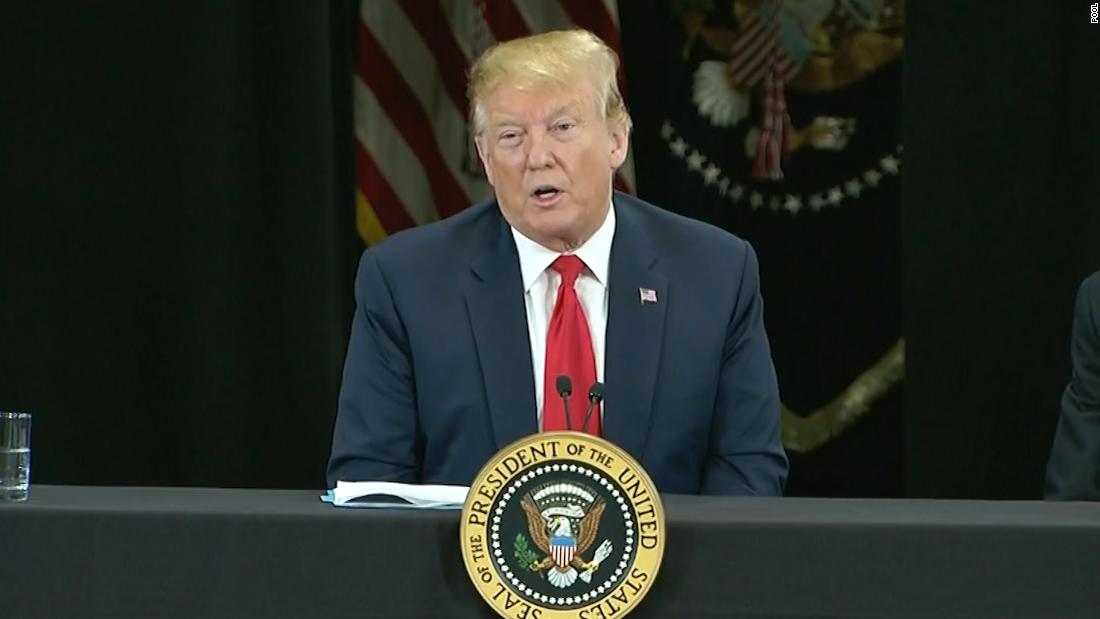
One of Trump's latest tweets, in which he tries to tie Omar to the Democratic House leadership at large, suggests something larger is at play.
It's the latest sign that Trump (and the Republican Party) recognizes he probably cannot win a 2020 election that is a referendum on his presidency. He needs 2020 to be a choice between a "radical" Democratic Party and himself.
Trump's re-election problem: A consistently low approval rating
Trump hasn't seen his approval rating go above his disapproval rating in over two years. Almost nothing seems to move it. Even strong economic approval ratings cannot lift the President to a positive net approval rating (approval - disapproval rating).
A negative net approval rating would normally spell doom for a president's re-election campaign. Both presidents who ran for re-election sporting a negative net approval rating in the polling era (Jimmy Carter in 1980 and George H.W. Bush in 1992) lost. The two presidents (Harry Truman in 1952 and Lyndon Johnson in 1968) who decided not to run for another term in the polling era had negative net approval ratings on Election Day.
And for those who don't see how Trump could suffer from a negative net approval rating, just remembered what happened to the Republicans in the midterms.
Trump's solution for being unliked: The 2016 playbook
Trump and his team want to recreate the dynamic of 2016. Trump was even more unpopular then than he is now. In the exit polls, he had a -22 point net favorability rating. But Trump was able to win because Hillary Clinton's net favorability was also in the red, and he won the lion share of those voters who had an unfavorable opinion of both.
Obviously, there's no way of knowing who Trump's opponent will be in 2020. Still, this is a presidential field sporting a number of very liberal candidates. Attacks like the ones against Omar are laying the groundwork for calling the eventual nominee extreme. We've already seen similar attacks against Alexandria Ocasio-Cortez coincide with drops in her popularity in the last few months.
Can Trump pull the 2016 trick, while being an incumbent? See Nevada 2010.
There have been no presidential campaigns in which a president with a net negative approval or favorability has won. There is, however, a precedent on the Senate level. Trump wants to do what Democrat Harry Reid did in his 2010 Nevada Senate re-election campaign.
For those that don't remember, Reid, then the Senate Majority Leader, looked destined to lose. The 2010 Nevada exit poll reveals that then-President Barack Obama had a negative net approval rating in the state, which was deep in the Great Recession at the time. Reid, too, had a negative net approval rating.
But Reid though had a secret up his sleeve: Republican opponent Sharron Angle. She was very conservative and a gaffe machine, which Reid's campaign more than took advantage of. Although Reid sported a negative net favorability rating, Angle's net favorability rating was somehow even lower.
The result was a Reid victory of over 5 points.
Presidential elections can be a choice, too
Usually, how you feel about the president shapes how you feel about his opponent. Presidents who most voters approve of generally end up being better liked than their opponents.
There is, however, precedent for an election where the president's popularity didn't tell the whole story: 1976. President Gerald Ford had, by Gallup and the American National Election Studies' measures, a positive net approval rating. Yet he lost to the better liked Jimmy Carter, who benefitted from the fallout following Watergate.
Indeed,data collected by CBS News and Gallup since 1956 suggest that presidential elections can be thought of as choice elections.
Over this period (since 1956), there have been 10 presidential elections in which the incumbent ran. This is a rather small sample size, but the popular vote margin in these elections has been better predicted by the difference in the net favorability ratings between the two major candidates than the president's net approval rating. Put another way, once you account for the difference in net favorability between the candidates, a president's net approval rating doesn't give us any additional information.
The bottom line: Expect more and more attacks from Trump
Trump still has time to turn his net approval rating positive, but it seems less likely by the day. Trump and his team recognize that.
That means his 2020 election chances probably hinge on the election being a choice between a disliked opponent and himself. With that in mind, he'll go over the Democratic Party and his eventual opponent with all possible force.
Bagikan Berita Ini














0 Response to "Why Trump attacks: He knows he can't win a referendum election in 2020"
Post a Comment